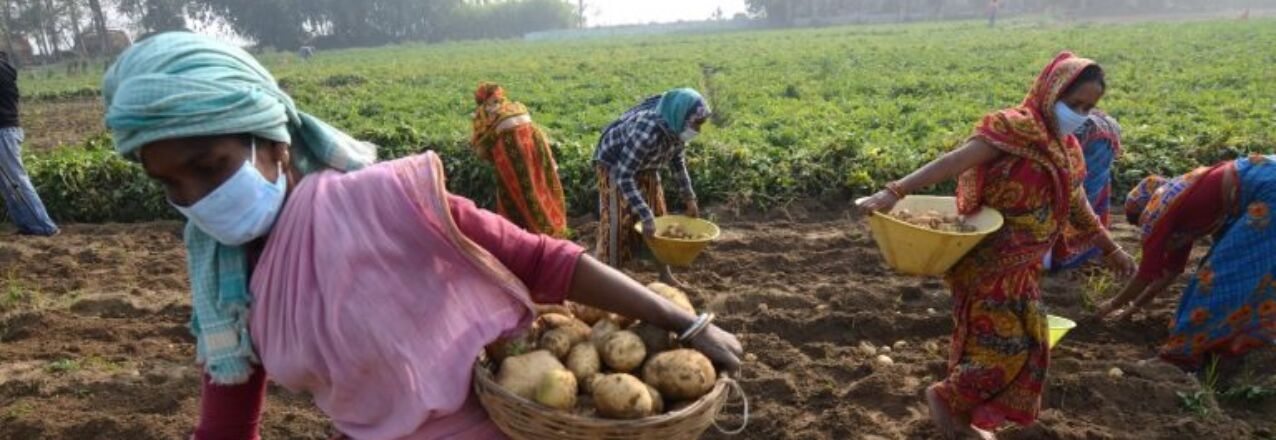This post was originally published on Agrilinks.
By Thais Bessa, Integrated Land and Resource Governance (ILRG) Gender Advisor.
Purnima Kora is an ambitious farmer. She owns two small parcels of land that she purchased with her husband’s support and years of savings she earned from farming PepsiCo potatoes and rice, as well as by leveraging micro loans through a women’s self-help group. She also leases another half-acre plot to farm potatoes.
Kora is fortunate: Access to land is a critical obstacle to women farmers in West Bengal, especially those from certain tribes and castes. While government land distribution programs register land individually to women or jointly to wives and husbands, women still face significant legal and social barriers to obtaining land through other means, such as inheritance, purchase and leasing. With limited ownership, access and control of land, women are less likely to receive other productive resources and benefit from income derived from agriculture.
A USAID-PepsiCo partnership is targeting female farmers like Kora to demonstrate that empowering women in the potato supply chain leads to better business performance and translates to improved revenue both for farming families and companies like PepsiCo. The program is using a combination of land literacy training, land leasing support and agronomic training to increase female farmers’ agency, productivity and income.
Implemented by the USAID ILRG program, the partnership’s land literacy training in land formalization and policy in India gives PepsiCo’s female farmers knowledge surrounding their rights as landowners and options for leasing land. Currently, only one of Kora’s two land plots is registered in her name. After receiving land literacy training, she plans to update the records on her second parcel in the public land registry. She now knows that updating the record will provide security, allow her to access additional governmental support services and help her to achieve her ambitions as a farmer.
USAID and PepsiCo are also supporting women’s self-help groups to lease land to grow potatoes independently. Over the past two years, women’s land leasing groups supported by the partnership joined the commercial potato value chain as PepsiCo suppliers, with production levels comparable to male farmers. Leasing land and farming as a group is attractive to women for economic reasons, as it mitigates risk and enables them to pool resources and skills to farm. Group farming is attractive for social reasons too, providing women with collective power to earn the trust of landowners and negotiate lease terms. Working as a group also helps women obtain support from family members and the community and offers physical safety when they are in the fields together.
Land access unlocks other productive resources
Just as training alone may have limited impact in areas where women do not have access to land, access to land alone is not necessarily enough to empower female farmers. To support them to make the most of owning or leasing land, USAID and PepsiCo are providing female potato farmers with technical training on sustainable farming practices and potato agronomy — delivered by female agronomists — covering topics like land preparation, planting, safe use of agrochemicals, harvesting, sorting and grading and record keeping. So far, the program has supported nearly 1,200 female farmers, who have received this type of training and support for the first time.
Before the USAID-PepsiCo partnership, Kora had never received specialized agronomic training. She had learned everything she knew about farming through observation and practical experience. Now, she can combine her years of experience with technical knowledge for improved yields, lower potato rejection rates and greater adoption of sustainable farming practices.
“I know I can apply these lessons in my fields, especially in the areas of seed cutting, planting, irrigation and using pesticides cautiously,” she reflected. “The training has given me additional confidence to manage potato farming independently. That is why I urged other members of my women’s group to participate in the training.”
Leasing land and improving their farming skills has enabled women to formally enter and enhance their roles in the potato supply chain. As Kora says, “I manage the whole pursuit of potato farming by myself, and the decision on which land is to be farmed with which variety of potato is mine. I still consult with my husband when I feel the need, but I have the freedom to make the final call, which even involves hiring labor.”
Over the past two years, greater access to productive resources like land and information has increased women’s individual and collective agency, confidence, mobility, income, decision-making power and recognition as farmers by family and community members. In turn, this is increasing the farming supply base for PepsiCo, improving potato productivity and promoting the adoption of sustainable farming practices that contribute to USAID’s and PepsiCo’s climate change commitments, showing that women’s empowerment makes social, economic and environmental sense.


